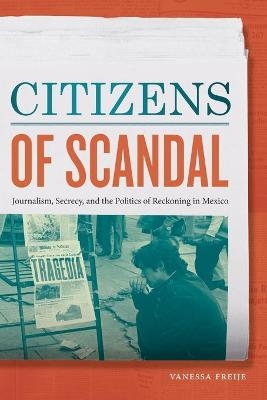
Citizens of Scandal
Journalism, Secrecy, and the Politics of Reckoning in Mexico
Seiten
2020
Duke University Press (Verlag)
978-1-4780-1088-3 (ISBN)
Duke University Press (Verlag)
978-1-4780-1088-3 (ISBN)
Vanessa Freije explores the causes and consequences of political scandals in Mexico from the 1960s through the 1980s, showing how Mexico City reporters began to denounce government corruption during this period in ways that defined the Mexican public sphere in the late twentieth century.
In Citizens of Scandal, Vanessa Freije explores the causes and consequences of political scandals in Mexico from the 1960s through the 1980s. Tracing the process by which Mexico City reporters denounced official wrongdoing, she shows that by the 1980s political scandals were a common feature of the national media diet. News stories of state embezzlement, torture, police violence, and electoral fraud provided collective opportunities to voice dissent and offered an important, though unpredictable and inequitable, mechanism for political representation. The publicity of wrongdoing also disrupted top-down attempts by the ruling Partido Revolucionario Institucional to manage public discourse, exposing divisions within the party and forcing government officials to grapple with popular discontent. While critical reporters denounced corruption, they also withheld many secrets from public discussion, sometimes out of concern for their safety. Freije highlights the tensions—between free speech and censorship, representation and exclusion, and transparency and secrecy—that defined the Mexican public sphere in the late twentieth century.
In Citizens of Scandal, Vanessa Freije explores the causes and consequences of political scandals in Mexico from the 1960s through the 1980s. Tracing the process by which Mexico City reporters denounced official wrongdoing, she shows that by the 1980s political scandals were a common feature of the national media diet. News stories of state embezzlement, torture, police violence, and electoral fraud provided collective opportunities to voice dissent and offered an important, though unpredictable and inequitable, mechanism for political representation. The publicity of wrongdoing also disrupted top-down attempts by the ruling Partido Revolucionario Institucional to manage public discourse, exposing divisions within the party and forcing government officials to grapple with popular discontent. While critical reporters denounced corruption, they also withheld many secrets from public discussion, sometimes out of concern for their safety. Freije highlights the tensions—between free speech and censorship, representation and exclusion, and transparency and secrecy—that defined the Mexican public sphere in the late twentieth century.
Vanessa Freije is Assistant Professor in the Henry M. Jackson School of International Studies at the University of Washington.
List of Illustrations ix
List of Abbreviations xi
Acknowledgments xiii
Introduction 1
1. Reckoning with the Revolution 23
2. "Vehicles of Scandal" 51
3. Muckraking and the Oil Boom and Bust 79
4. The Spectacle of Impunity 107
5. A Mediated Disaster 138
6. The Weaponization of Scandal 167
Epilogue 193
Conclusion 199
Notes 207
Bibliography 255
Index
| Erscheinungsdatum | 11.09.2020 |
|---|---|
| Zusatzinfo | 13 illustrations |
| Verlagsort | North Carolina |
| Sprache | englisch |
| Maße | 152 x 229 mm |
| Gewicht | 431 g |
| Themenwelt | Literatur ► Essays / Feuilleton |
| Geisteswissenschaften ► Geschichte ► Regional- / Ländergeschichte | |
| Sozialwissenschaften ► Kommunikation / Medien ► Journalistik | |
| Wirtschaft | |
| ISBN-10 | 1-4780-1088-6 / 1478010886 |
| ISBN-13 | 978-1-4780-1088-3 / 9781478010883 |
| Zustand | Neuware |
| Haben Sie eine Frage zum Produkt? |
Mehr entdecken
aus dem Bereich
aus dem Bereich
Erinnerungen
Buch | Softcover (2024)
Pantheon (Verlag)
CHF 22,40
Universalgelehrter, Polarreisender, Entdecker
Buch | Hardcover (2024)
mareverlag
CHF 39,20


